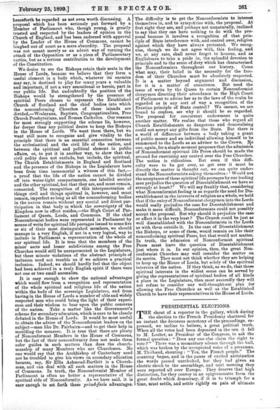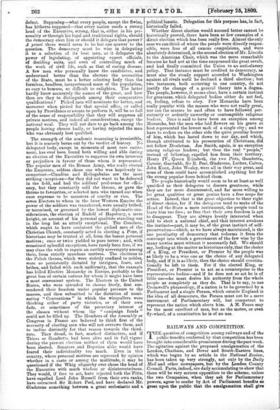PRESIDENTIAL ELECTIONS. T HE shout of a reporter in the gallery,
which during the election to the French Presidency shattered for an instant the decorous monotony of the proceedings, ex- pressed, we incline to believe, a great political truth. When all the votes had been deposited in the urn it fell to M. Loubet, as President of the Congress, to ask the formal question : " Does any one else claim the right• to vote ?" There was a momentary silence through the hall, which was broken by the unexpected voice of a pressman. M. Thi6baud, shouting : " Yes, the French people." The counting began, and in the pause of excited anticipation the words passed unrebuked, but they had given an electric shock to the assemblage, and next morning they were reported all over Europe. They deserve that high distinction, for they convey in an epigrammatic form the great doubt which democracy, if it is to triumph for a time, must settle, and settle rightly on pain of ultimate defeat. Supposing—what every people, except the Swiss, has hitherto supposed—that every nation needs a strong head of the Executive, strong, that is, either in his per. sonality or through his legal and traditional rights, should the democracy elect him or should it delegate that power ? A priori there would seem to be but one answer to the question. The democracy must be wise in delegating it to a selection of its best men, as it delegates the power of legislating, of appointing expert officials, of deciding suits, and even of controlling much of the work of civil life, such as that of curing disease. A few men who personally know the candidates, and understand better than the electors the necessities of the State, must be a better selecting body than the formless, headless, inexperienced mass of the population, so easy to bemuse, so difficult to enlighten. The latter hardly know accurately the names of the great, and how then are they to distinguish among their comparative qualifications ? Picked men will nominate far better, and moreover when picked for that special office, or called upon by Providence or events to perform it, will be so full of the sense of responsibility that they will suppress all private motives, and indeed all considerations, except the national weal. They will not dare to go back among the people having chosen badly, or having rejected the man who was obviously best qualified.
The strength of the academic reasoning is irresistible, but it is scarcely borne out by the verdict of history. No delegated body, except in moments of most rare excite- ment, has ever been found both willing and able during an election of the Executive to suppress its own interests or prejudices in favour of those whom it represented. The popular men of the Roman Army, who really elected the Emperors, seldom chose one who was hopelessly in- competent—Claudius and Heliogabalus are the most striking exceptions—for they did not want to be defeated in the field, and had the soldiers' preference for effici- ency, but they constantly sold the throne, or gave the throne to favourites, or selected men who turned out when once supreme to be monsters of cruelty or vice. The seven Electors to whom in the later Western Empire the power of the soldiers was transferred, were usually bribed, or terrorised, or governed by the lowest diplomatic con- siderations, the election of Rudolf of Hapsburg, a mere knight, on account of his personal qualities standing out in the long list as utterly exceptional. The Conclave, which ought to have contained the picked men of the Christian Church, constantly acted in electing a Pope, if historians may be trusted at all, from the basest personal motives ; once or twice yielded to pure terror ; and, with occasional splendid exceptions, have rarely been free, if we may class the wish to regain an earthly sovereignty among them, from strictly mundane motives. The elections to the Polish throne, which were strictly confined to nobles, were so persistently dictated by intrigues, fears, and bribes, and failed with such uniformity, that the example has killed Elective Monarchy in Europe, probably to the great loss of certain nations for whom it might have been a most convenient system. The Electors in the United States, who were intended to choose freely, first sur- rendered their freedom under popular pressure to the masses, and then submitted to the dictation of nomi- nating " Conventions " in which the wirepullers were thinking either of party victories, or of their own fads, or sometimes of the pecuniary interest of the classes without whom the " campaign funds " could not be filled up. The Members of the Assembly or Congress in France are believed to think first of the necessity of electing men who will not overawe them, and to incline distinctly for that reason towards the third- rate. They dread, in fact, marked distinction, and if Thiers or Gambetta had been alive and in full vigour during the present election neither of them would have been elected. Senators and Deputies alike would have feared their individuality too much. Even in this country, where personal motives are repressed by opinion whether in a caste or among the multitude, it may be questioned if the Whig oligarchy ever chose the head of the Executive with much wisdom or disinterestedness. They would, if free to act, have rejected both theTitts, have expelled Lord John Russell from their own ranks, have ostracised Sir Robert Peel, and have declared Mr. Gladstone something between a great ecclesiastic and a political lunatic. Delegation for this purpose has, in fact, historically failed.
Whether direct election would succeed better cannot be historically proved, there have been so few examples of a direct election which has been really free. Almost the only case we can think of where the people were directly respon- sible, were free of all caucus compulsions, and were absolutely determined, is the second election of Mr. Lincoln to the American Chair, which was the more remarkable because he had not at the time suppressed. the great revolt, and had finally committed. the Union to an anti-slavery policy. That instance must be credited to democracy, as must also the steady support accorded to Washington against all rivals until he declined a third election ; but two instances, both occurring in one country, do not justify the change of a general theory into a dogma. The people, however, it seems clear, have a certain instinct for greatness, which delegated bodies either do not feel, or, feeling, refuse to obey. Few Monarchs have been really popular with the masses who were not really great, nor can the masses be said often to have followed per- sistently or ardently unworthy or contemptible religious leaders. Nero is said to have been an exception among Monarchs, but the men who laid flowers on his grave at best represented the lowest mob of a single city; and we have to reckon on the other side the quite peculiar horror of him, which has lasted down to our day, and which, though attributed to his persecution of Christians, did not follow Diocletian. Joe Smith, again, is an exception among religious leaders; but then the real " people," instead of following, expelled him from their territory. Henry IV., Queen Elizabeth, the two Pitts, Gambetta, Cavonr, Garibaldi, Sir R. Peel, Gladstone, Luther, Calvin, John Knox, John Wesley, were all in their way great, and none of them could have accomplished anything but for the strong popular force behind them.
The people historically would seem to be at least as well qualified as their delegates to discern greatness, while they are far more disinterested, and far more willing to let great qualities or great genius have a free scope for action. Indeed, that is the great objection to their right of direct choice, for if the delegates tend to make of the Head of the State a mere instrument, the people tend to leave him too free ; so free that their own freedom is apt to disappear. They are always keenly interested when told to elect a national chief, and that interest awakens the instinct—part, it may be, of the great instinct of self- preservation—which, as we have always maintained, is the one peculiarity of democracy that redeems it from the contempt into which a government of the few wise by the many unwise must without it necessarily fall. We should say, looking at the matter as historians only, that the choice of a King, or President, or Premier by the people was as likely to be a wise one as the choice of any delegated body, and if it is as likely, then the choice should constitu- tionally be left to them. For if the elected King, or President, or Premier is to act as a counterpoise to the representative bodies—and if he does not so act he is of little use—he must derive his authority from the whole people as completely as they do. That is to say, to use Cromwell's phraseology, if a nation is to be governed by a Parliament and a single Person, which outside England is the idea of all democrats, the Person must not be a mere instrument of Parliamentary will, but competent to represent the nation which elects him. A M. Faure may be the most excellent of men, but as the motor, or even fly-wheel, of a constitution he is of no use.







































 Previous page
Previous page